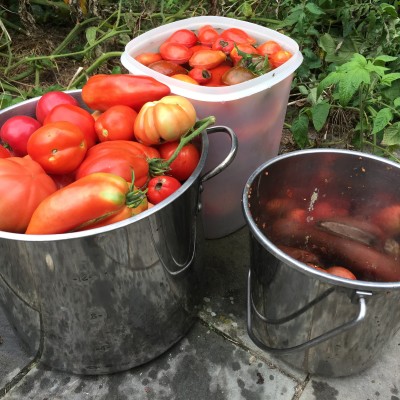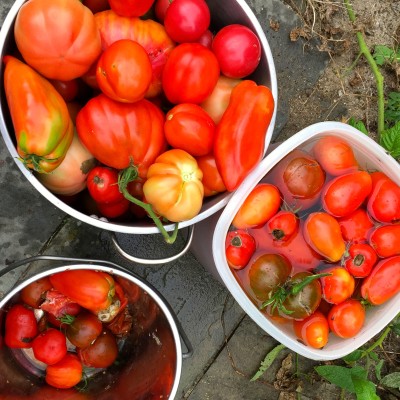And therein lies the heartbreak.
Every morning, we find the wreckage of what we’ve left behind: pecked apart by birds, burrowed by worms, the elusive over-ripe and overlooked beauties grown soft and watery with decay. The squirrels — a superstitious species, I think — regularly deposit vegetables in stray locations as if making offerings to stave off some night-time terror. We often find a partially gnawed tomato, propped atop a 7-foot tall trellis that is a popular squirrel run.
Of course, I mock the trauma caused by these losses, but I’ve heard new gardeners sorely vexed by such “waste.” Some cite it as a reason to give up gardening. We prefer to view it more as generosity to the other creatures who abide in our garden. Like every phase of the gardening season, harvest work reminds us that we are not alone.
Be not deceived: harvest is work too, perhaps not as physically demanding as other chores, but gathering the produce, sorting, washing, and storing or preserving all adds up to work.
Today, twenty minutes of diligent effort filled two big buckets with tomatoes. And it nearly filled our slightly smaller compost bucket with specimens too far gone to save. We usually make the most of slightly imperfect tomatoes, that is at least 50% in good shape. Our home-grown standards are different than grocery store ones: these are the fruits of our labors, so we are going to use whatever we can. I often pare away damaged areas and use the salvaged parts in tomato sauce. There’s a big pot of tomatoes simmering on the stove at least one or two times a week.
The bounty is partially our own fault for planting so many tomato plants, I admit, but the wide range of varieties available is seductive. We intentionally are generous with our planting, for ourselves and for the creatures big and small who make up the local ecosystem. We might whine a little about their appetites, but we enjoy the antics of the squirrels. We also appreciate knowing that our crops bring pollinators into the area as well as other insects who consider our garden “good”.
We plant enough to share, even if we view the vegetables and fruits as ours. We live with a little heartbreak, maybe even embrace it, because the good news is there’s more than enough harvest to go around.




